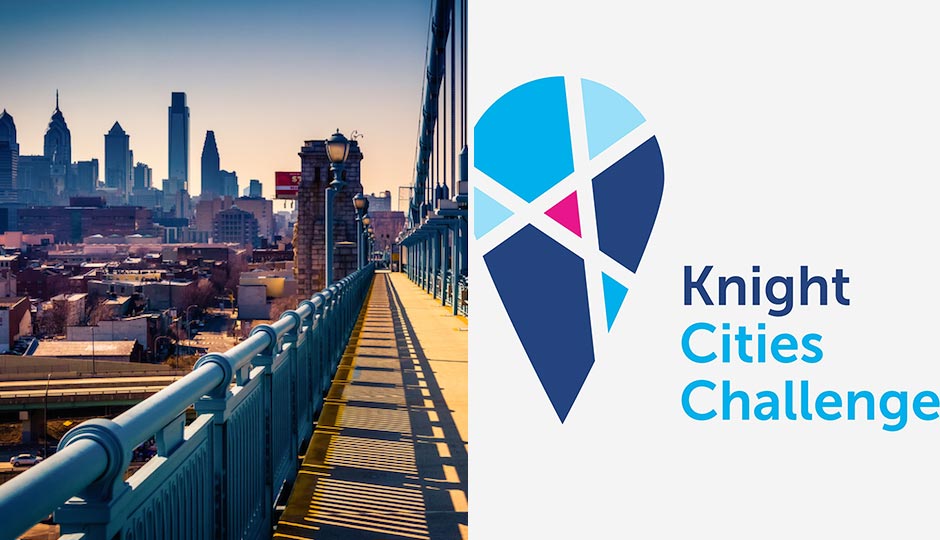Philly Has More Knight Cities Challenge Finalists Than Anyone Else

Philly Skyline | Shutterstock
The Knight Foundation has chosen 158 finalists from more than 4,500 applications for Knight Cities Challenge grants, and 20 of those 158 are from Philadelphia, more than any other city among the 26 eligible to participate.
The Knight Cities Challenge awards grants to projects that make the cities where the Knight Foundation operates more vibrant places to live by attracting and retaining talented people, expanding and breaking down barriers to economic opportunity, and fostering connection and civic involvement. The 20 Philly finalists and their project sponsors are:
- The Meadow at Wister Station (Baynton Hill Neighbors Association): A community revitalization project to create a perennial garden in the blighted corridor around Wister Regional Rail station in Germantown.
- The Family Garden (Group Melvin Design): A project to keep talented Millennials with children in the city by turning the pop-up beer garden into a family-focused neighborhood experience.
- The Little Music Studio (Group Melvin Design): Breaking down community barriers with a traveling playground for musicians.
- 20 Book Clubs, 20 Cooperative Businesses (Philadelphia Area Cooperative Alliance): A project to increase civic engagement and economic opportunity by launching 20 neighborhood book clubs whose participants will study and learn how to form their own cooperative businesses.
- Councilmatic: Get Alerts for Local Events (Participatory Politics Foundation): Increasing civic engagement by allowing citizens to get email and text alerts about upcoming public events such as city-sponsored meetings.
- Real World 101 (The Enterprise Center): Retaining talented college students in the city by partnering them with local businesses around mutually beneficial projects like building websites and refining financial plans.
- City Safari (City Safari): Group tours that take participants to off-the-beaten-path locations as a means of increasing civic engagement.
- Diner de Famille – Philadelphia, 2016: A family-oriented twist on Diner en Blanc, held on the same night as the global event, that seeks to break down community barriers.
- Beyond the Census: Building a Positive Story of a Community’s Human Resources (Germantown United CDC): This project uses new data about underserved neighborhoods to attract new businesses and investment.
- Harlem Renaissance: Multicity Retrospective Festival (The Brothers Network): Breaking down barriers and fostering community pride by showcasing the contributions of African-American men to the cultural life of Knight communities.
- Viola Street Connector (Viola Street Residents Association): This project seeks to use art and events to transform a dilapidated alley connecting the Parkside and Centennial historic districts and break down community barriers.
- The Colored Girls Museum (The Colored Girls Museum): A project to build community pride in Philadelphia’s underserved neighborhoods with exhibits that tell the stories of local black women in residents’ houses.
- Breaking Bread, Breaking Barriers: Food as a Bridge to Cultural Understanding (Reading Terminal Market): The city’s culinary cultural mixing bowl seeks to build bridges to Philadelphia’s immigrant communities through cooking classes celebrating ethnic food led by RTM chefs.
- Reengaging Youth in Urban Communities: Design Build Rebooted (Lindy Institute for Urban Innovation, Drexel University): A Drexel-run design-build studio that would increase civic engagement by helping local high school students reshape the communities where they live.
- Institute of Hip-Hop Entrepreneurship (Little Giant Creative): This proposal uses hip-hop to provide hands-on training to low-income citizens and increase economic opportunity.
- Boat Philly (Fairmount Park Conservancy): A project to promote boating citywide by transforming underused Meadow Lake in South Philly’s FDR Park into an active urban boating destination.
- DoGoodr (The Philadelphia Citizen): An app to increase civic engagement by connecting city residents and organizations with one another for learning opportunities and action.
- Money Laundering: So Clean, How Can It Be Free? (Forward LLC): Or, if you will, “Our Beautiful Laundrette”: a project to increase economic opportunity and civic engagement by transforming a rundown laundromat into a public gathering place that also offers free laundry services.
- Rewilding Philadelphia (Groundswell Design Group): A project to help residents learn about the environment and reconnect with nature through a network of parks and “wild” spaces across the city.
- Workspace Project Pop-Up (Groundswell Design Group): One of those projects that thinks inside the box, in this case by repurposing shipping containers into affordable community co-working spaces as a means of attracting and retaining talent.
These 20 finalists were chosen from 472 applications received from individuals and groups in Philadelphia. Only two other Knight cities had more applications: the foundation’s home base of Miami and Detroit.
“The applications were uniformly creative, exciting and ambitious,” said Carol Coletta, vice president for community and national initiatives at the Knight Foundation. “That’s almost the hallmark of a Philadelphia application. And they’re well packaged too.”
Knight Foundation Philadelphia Program Director Patrick J. Morgan said that what made these projects appealing is that “they’re playing on the opportunities already available in Philadelphia. You see that Philly grit, that Philly attitude of being a city of firsts, a city of innovation, a city that just doesn’t give up.”
Another element that appealed to the foundation, Coletta said, was that so many of the projects took now-familiar elements of urban life, such as pop-up beer gardens, and reimagined them.
“Another thing that’s exciting,” she said, “is that there’s an emphasis on families.” Many of the projects address the question “How do you acknowledge that a lot of the young people who moved back into the city as young adults are now having families, and how do you keep them in the city and serve their needs?”
The finalists’ proposals will be reviewed by a panel that includes past grant winners from the 26 Knight cities and professionals from other cities. The panel will in turn recommend projects to the Knight Foundation board, which will select the winners. The winners should be announced at the end of March or in early April.
Follow Sandy Smith on Twitter.


